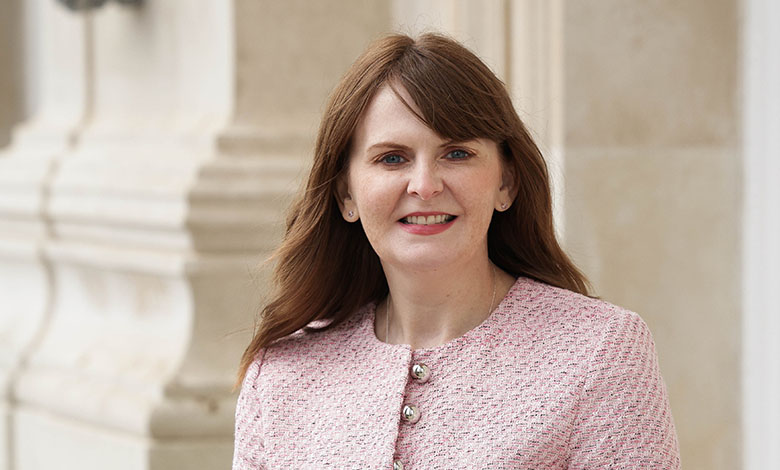
Solutions for a sustainable agriculture industry
16th May 2025
Working in collaboration to unlock the potential of the network
27th May 2025Economy Minister: Progressing the energy transition

Writing in agendaNi, Economy Minister Caoimhe Archibald MLA outlines the progress of the energy transition in pursuit of a decarbonised economy.
Decarbonising our economy by 2050 is not just a moral and legal obligation. It is also an opportunity to reduce business costs and improve household incomes across the region.
A just transition allows us to move away from our long-term over-reliance on fossil fuels, and the cost volatilities that come with that over-reliance.
Recent extreme weather events and shocks to global energy systems have highlighted the importance of harnessing the abundance of renewable energy sources on this island, so that we may take control of our own energy future.
Therefore, we continue to strive towards self-sufficiency in affordable renewable energy, which will enable our homes and businesses to pay a fair price for the energy they consume.
Delivery of the 2021 Energy Strategy: Path to Net Zero Energy long-term vision of net zero carbon and affordable energy can help to advance my four economic priorities of creating more good jobs; addressing regional imbalance; increasing productivity; and delivering decarbonisation.
Progress towards a decarbonised energy system and a net zero economy cannot be done in isolation. My Department and my Executive colleagues are committed to establishing a robust regulatory environment, with fit for purpose and modern legislation to ensure both public and private stakeholders can play their part in the energy transition.
It is also paramount that the cost of delivering emission reductions does not fall disproportionately on vulnerable consumers. The only way this can be achieved is through collaboration with communities, businesses, local government, statutory partners, and all of those who have an interest in creating an inclusive and equitable path towards a sustainable future.
Mid-term review
By the end of 2025, my department will have completed a mid-term review of the 10-year Strategy, to ensure that we are focused on delivering our decarbonisation targets and Climate Change Act requirements for the remainder of this decade.
The mid-term review is one of 19 cross-government actions outlined in the Energy Strategy Action Plan 2025, published in March 2025, and highlights the array of policies being brought forward by my department and government colleagues as we seek to deliver a step change in delivery pace.
80 by 30
A whole-system approach is needed to deliver on the challenging Climate Change Act target of delivering at least 80 per cent electricity consumption from renewable sources by 2030. My department has lead responsibility for the target, but collaboration across departments and with wider stakeholders, is essential to successful delivery.
To meet this target, more renewable electricity capacity will be required, as committed to in the Programme for Government 2024-2027.
However, this will not be delivered without planning consent for significant electricity transmission and distribution infrastructure projects, which highlights the cross-cutting nature of our collective challenge.
In the coming months, I will publish the final scheme design for new renewable electricity support, which will include eligibility criteria, delivery roles and responsibilities, and an outline of the contract allocation process.
This support will be known as the Renewable Electricity Price Guarantee (REPG) and I plan to bring primary legislation before the Assembly in 2025, with subordinate regulations to follow, as we move towards implementation.
Grid investment
Increasing renewable deployment must be matched by investment in infrastructure. Work is ongoing with key partners to ensure that our grid and energy systems are prepared to accommodate greater levels of clean electricity.
The Utility Regulator’s approval of Northern Ireland Electricity Networks’ RP7 Business Plan at the end of 2024 represented the largest ever investment in the operation and expansion of the electricity grid and will go a long way to delivering the network we need.
The North-South Interconnector is a critical project which will benefit electricity consumers, increase security of supply, and facilitate more renewable electricity onto the grid.
In addition, we must also ensure that we maximise the renewable resources currently available to us. Dispatch down occurs when, for operational reasons some renewable generators are asked not to produce as much power as they otherwise would, it is a feature of every electricity system. However, current levels here are higher than we would wish. My officials are engaging with SONI and the Utility Regulator on reducing the levels of dispatch down with the aim of ensuring the delivery of more renewable electricity onto the grid at lower cost.
Smart meters
As a further commitment of the Energy Strategy Action Plan 2025, later in 2025 I will launch the Smart Meters Design Programme. Smart meters will empower consumers to control their own energy usage through access to an enhanced level of information on their energy consumption. The rollout will also support the delivery of real-time balancing on the system of supply and demand, in turn delivering a reduced need for extra electricity grid-strengthening projects and lower carbon emissions.
Energy efficiency
Beyond electricity, my department is finalising a consultation on evidence-based options for domestic energy efficiency support for publication also later in 2025, the outcome of which will help to inform the design, rules, and guidance of future support for domestic energy efficiency across the north.
Over the past two years my department has invested £3.5 million in the NI Sustainable Energy Programme (NISEP), with a focus on insulation measures to 1,500 low-income households. I have asked my officials to continue to work with partners to assess the options for further scaling up of existing energy efficiency programmes and I am pleased that they continue to engage with colleagues to learn about retrofitting and funding options which are in place.
Additionally, my department continues to work on a number of biomethane actions as part of the Energy Strategy Action Plan 2025. Having recently published the responses to the Developing Biomethane Call for Evidence, we are working closely with partners to develop an economic and sustainable biomethane sector which is fair and offers consumers competitive pricing.
To 2030 and beyond
Alongside a focus on the 80 by 30 target, we must also ensure that we are creating a pathway to meet the overarching net zero by 2050 target. Following development of the Offshore Renewable Energy Action Plan (OREAP), my department recently consulted on the OREAP: Strategic Environmental Assessment (SEA) Environmental Report and Report to Inform the Appropriate Assessment (RIAA). This will help us identify suitable marine areas which maximise the potential of offshore renewable energy whilst minimising ecological disruption to the seabed and to those who live and work in coastal areas.
Similarly, following the establishment of a Hydrogen Industry Working Group, I intend to publish a hydrogen policy consultation paper, which will inform an action plan to assist industry with the development of a resilient low carbon hydrogen sector as an integral part of our energy system.
Conclusion
The Programme for Government commits us to decarbonisation and to embracing the economic opportunities that our renewables sector can bring. If we are to maximise these economic opportunities, it is critical that homes and businesses experience the tangible benefits of this transition.
The 2021 Energy Strategy’s first key principle was to place consumers at the heart of our energy future, and it is essential that this remains a central pillar as we move towards meeting our ambitious and challenging 2030 targets.
Moving away from cost volatility for our current energy use is key to ensuring a just transition, protecting consumers today and tomorrow.
Improving outcomes for homes and businesses across the region requires a collective effort to ensure that people feel informed, equipped and supported to make the necessary change that will drive the transition.
